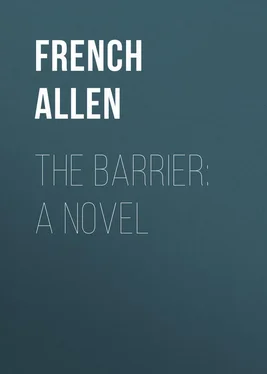Allen French - The Barrier - A Novel
Здесь есть возможность читать онлайн «Allen French - The Barrier - A Novel» — ознакомительный отрывок электронной книги совершенно бесплатно, а после прочтения отрывка купить полную версию. В некоторых случаях можно слушать аудио, скачать через торрент в формате fb2 и присутствует краткое содержание. Жанр: foreign_antique, foreign_prose, на английском языке. Описание произведения, (предисловие) а так же отзывы посетителей доступны на портале библиотеки ЛибКат.
- Название:The Barrier: A Novel
- Автор:
- Жанр:
- Год:неизвестен
- ISBN:нет данных
- Рейтинг книги:4 / 5. Голосов: 1
-
Избранное:Добавить в избранное
- Отзывы:
-
Ваша оценка:
- 80
- 1
- 2
- 3
- 4
- 5
The Barrier: A Novel: краткое содержание, описание и аннотация
Предлагаем к чтению аннотацию, описание, краткое содержание или предисловие (зависит от того, что написал сам автор книги «The Barrier: A Novel»). Если вы не нашли необходимую информацию о книге — напишите в комментариях, мы постараемся отыскать её.
The Barrier: A Novel — читать онлайн ознакомительный отрывок
Ниже представлен текст книги, разбитый по страницам. Система сохранения места последней прочитанной страницы, позволяет с удобством читать онлайн бесплатно книгу «The Barrier: A Novel», без необходимости каждый раз заново искать на чём Вы остановились. Поставьте закладку, и сможете в любой момент перейти на страницу, на которой закончили чтение.
Интервал:
Закладка:
This move of Mather's had taken her by surprise; at a step he had gained a new position. No offers from the rich men moved him to sell; he replied that he meant to carry out his plans. So a whole section of the town was put in order for the families of the new workmen. Judith, hearing of all this, complained to Mather when she met him.
"And yet," he responded, "the mill is a mile from the nearest estate; the whole town lies between. As for what clearing up I've done, I value picturesqueness, Judith, but the place is now ten times healthier. And we are putting in smoke-consumers."
"Yet from most of our houses we can see your chimney."
"Judith, for that one eyesore which I put up I will remove ten from the town."
"But who asked you to do it? You never lived here; you have no love for the place."
"I have lived," he replied, "in other New England towns, equally degenerate."
"I am not speaking of the townspeople," she said. "I mean the summer residents."
"Wasn't it your father's matter to think of them?"
Judith had felt the discussion to be going against her. Therefore she answered with some warmth: "That is another question entirely!"
"I beg your pardon, Judith," he said. "But mayn't I describe my plans?"
"No," she answered; "I don't think it is necessary."
"Very well," he returned, and made no attempt to say more. Hurt, he fell into a mood of dogged endurance. "Very well," he repeated, and let the matter drop. Then Judith's interest was roused too late; he might really have had something to say. She knew that dirt was unhealthy; she remembered that in Chebasset drunkards on the street were more plentiful than in Stirling. Yet her generosity did not quite extend to recalling her words – partly because of natural pride, partly because she knew his interest in her and would not encourage it, partly again because she still resented his words to Ellis in her presence. And so the breach between them remained.
Yet he had already impressed her, by his manly readiness to begin life again, and by his steadiness under her fire. Confidence was, to Judith, almost a virtue. And the idea of reform always appealed to her: had the place been really so bad?
One by one the households had been moving down to Chebasset, and Beth had already opened the Blanchard cottage. On the evening after Judith had spoken with Mather she asked if Beth had noticed the changes in Chebasset.
"George's? At his mill?" asked Beth. "I think it's much improved. Those horrid tumble-down shanties are gone, and there are new houses there now – shingled and stained they are to be – with new fences."
"Father," asked Judith, "why didn't you do that?"
"My dear child," was his response, "how could I afford it?" The Colonel was always nervous when the subject of the new mill was broached, and quitted it as soon as possible. But Judith pursued him.
"I asked George if he had not treated us unfairly – the property owners, I mean. He seemed to think that was your affair."
Beth was up in arms at once. "For that chimney? He laid the blame on papa?"
The Colonel wiped his flowing mustache, and looked at Judith; Beth's outraged cry did not interest him so much as his elder daughter's stand. "What did you say to him?" he asked.
"I said that was another question."
"So it is," agreed the Colonel. "Entirely different." He looked at Beth to see if she were satisfied; she rose and came behind his chair, where she began smoothing his hair.
"Poor papa," she purred.
Blanchard swelled his chest. "Thank you, Beth," he said, but his thoughts went back to Judith. People took different stands on this matter; he was anxious to have Judith on his side. Fenno had told the Colonel that he, Fenno, ought to have been informed of the proposed sale; Branderson, less bluntly, had intimated the same. It was possible that Judith might take a similar view.
"I had others beside myself to consider," he said. "Dear papa!" murmured Beth. But Judith took it differently.
"I don't want to profit by the sale," she stated.
The Colonel offered no explanation. At the time of the sale he had not been thinking of his daughters, but of certain pressing creditors. So the money had been welcome and was already partly gone. He answered with grim knowledge of a hidden meaning.
"I'll take care you shall not profit by the transaction, Judith. But I am sorry that the mill is sold. I hate a disturbance."
"Don't you be sorry, papa!" exhorted Beth. But Judith delivered a shot which hit her parent between wind and water. It was one of those impromptus which come too quickly to be checked.
"Perhaps Mr. Fenno would have given more."
"Judith!" shouted her father, bouncing in his chair.
"I beg your pardon, papa," she said humbly.
When Judith was humble she was charming; the Colonel accepted her kiss and pardoned her. As for herself, she felt her spirit lightened, as by an electric discharge, and began to look at the whole question of Mather's mill more temperately. Why should she grudge him his success? It was so much less than Ellis's. When next she met Mather she was gracious to him, and was ready to hear a full account of all his plans, if only he would open the subject. He avoided it.
Then the Blanchards moved to Chebasset, and Judith saw the mill and chimney with her own eyes. People had stopped scolding about them; she found them not so bad as had been reported, and the chimney, though certainly tall, gave off but the slightest film of smoke. So thorough were Mather's improvements that they forced Judith's admiration. When she first went to the grocer's and, after making her purchases, inquired of the changes in the town, she heard a torrent of praise of Mather.
"It's a bad place he's cleaned out," the grocer said, coming very close and speaking confidentially. "Many young fellows were led wrong there, but the biggest saloon's gone now, and some of the worst men have left the town, and a man can feel that his own children have a chance of growing up decent. It's two boys I have, Miss Blanchard, that I was worrying about till Mr. Mather came."
"I am glad things are so much better," Judith said.
"They'll be better yet," the grocer responded. "Gross, the other saloon-keeper, has got to look after himself now. Mr. Mather had him in court only the other day – look, there they are now."
On the sidewalk outside stood a large man, gross as was his name; across the street Mather was unconcernedly walking. The saloon-keeper raised a fist and shouted at Mather, who paused and looked over at him inquiringly.
"I'll be even with you!" shouted Gross again.
"Wait a bit," answered Mather cheerfully, "I'll come over." He crossed the street and stepped directly to the saloon-keeper. "You'll be even with me for what, Mr. Gross?"
"For that fine," answered the other. "I'll have you in court yet, see if I don't."
"You'll have me in court," rejoined Mather, "when you catch me selling whisky to minors, not before, Mr. Gross. And while we're on this subject I may as well say that I've just sworn out a second warrant against you."
The saloon-keeper backed away from the very cool young man. "What yer goin' ter do?" he asked.
"I'm going to see," Mather answered, "that you observe the liquor laws. And when your license comes before the selectmen for renewal, I shall be at the hearing."
On Gross's face appeared blotches of white. "We'll see!" he blustered.
"We'll see," agreed Mather, and turned away.
The grocer spoke in Judith's ear. "That's the stuff! That's what, Miss Blanchard!" Waiting till Mather was gone, Judith left the shop and went home very thoughtful. So George was working, on however small a scale, for reform and progress. She could not fail to see that for his coming the whole town had a brisker, brighter look. Chebasset streets had been dull, sleepy, unpainted. Now fences were repaired, houses were freshened, and the townspeople looked better dressed, because the men were earning more money at the mill, or the women were gaining livings by boarding and lodging the new-comers. The town was changed, and Mather was the cause.
Читать дальшеИнтервал:
Закладка:
Похожие книги на «The Barrier: A Novel»
Представляем Вашему вниманию похожие книги на «The Barrier: A Novel» списком для выбора. Мы отобрали схожую по названию и смыслу литературу в надежде предоставить читателям больше вариантов отыскать новые, интересные, ещё непрочитанные произведения.
Обсуждение, отзывы о книге «The Barrier: A Novel» и просто собственные мнения читателей. Оставьте ваши комментарии, напишите, что Вы думаете о произведении, его смысле или главных героях. Укажите что конкретно понравилось, а что нет, и почему Вы так считаете.












